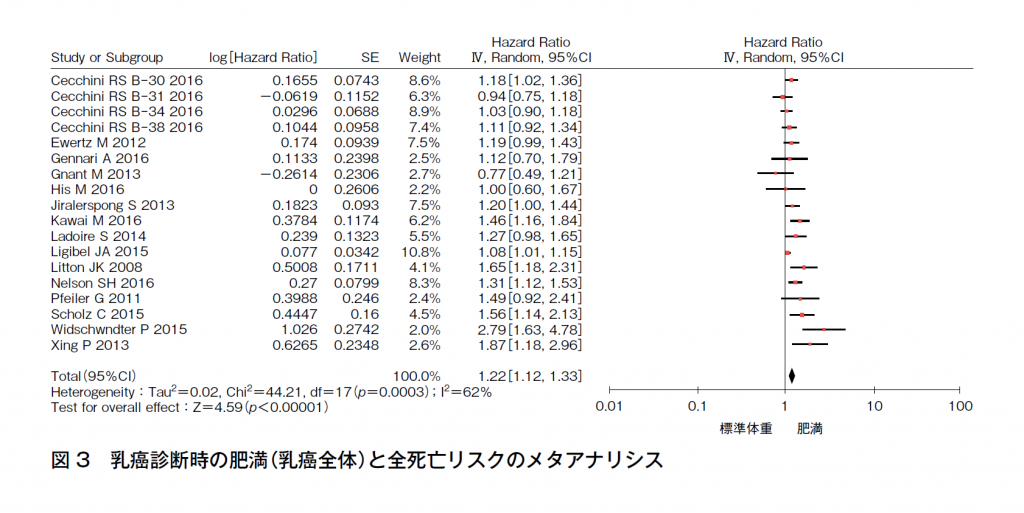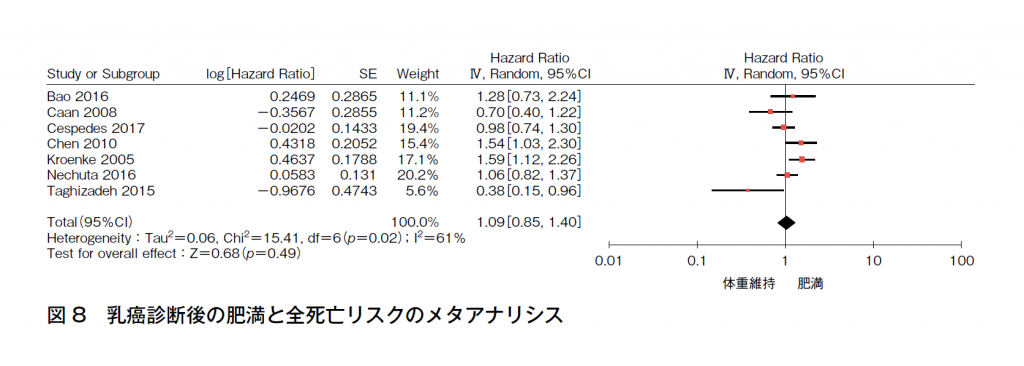CQ7a 乳癌診断時の肥満の場合
ステートメント
・乳癌全体で検討すると,乳癌診断時に肥満である患者の乳癌再発リスク,乳癌死亡リスクおよび全死亡リスクが高いことは確実である。
〔エビデンスグレード:Convincing(確実)〕・トリプルネガティブ乳癌(TNBC)に限って検討すると,乳癌診断時に肥満である患者の乳癌再発リスク,乳癌死亡リスクおよび全死亡リスクが高いかどうかは結論付けられない。
〔エビデンスグレード:Limited―no conclusion(証拠不十分)〕
CQ7b 乳癌診断後の肥満の場合
ステートメント
乳癌診断時より肥満度が上昇した患者において乳癌再発リスクおよび乳癌死亡リスクが高いことはほぼ確実である。
〔エビデンスグレード:Probable(ほぼ確実)〕
背景・目的
疫学・予防BQ7で記載されているように,閉経後日本人女性では肥満が乳癌発症リスクを増加させることは確実であり,閉経前日本人女性ではその可能性がある。乳癌診断時あるいは診断後の肥満が乳癌患者の予後に影響を与えるかもしれないという仮説が成り立つが,この仮説を検証することは乳癌患者の日常生活を指導するうえで極めて重要と考えられる。本項では肥満と乳癌患者の予後の間に関連があるか否かを,乳癌診断時の肥満と乳癌診断後の肥満に分けて検討した。
解 説
本項では,害のアウトカムとして乳癌再発リスク(重要度9点),乳癌死亡リスク(重要度8点),全死亡リスク(重要度8点)を設定した。
1)乳癌診断時の肥満
乳癌全体では計17件をシステマティック・レビューに用いた1)~17)。文献検索の過程でTNBCに限定した報告が複数認められたので,計4件10)18)~20)を選択し別途システマティック・レビューを行った。肥満の定義は各文献でbody mass index(BMI)で23~40以上とされていたが,30以上と設定し25未満の症例との比較検討が大多数であった。
(1)乳癌全体
① 乳癌再発リスク
17件(2件は2つの調査報告を含む)でメタアナリシスを行った(計43,810例)。効果に異質性はあるが,全体として有意な効果〔HR 1.18(95%CI 1.09―1.27)〕であった(図1)。文献数も多く,報告バイアスも認められないので結果の信頼性は高い。よって,乳癌診断時に肥満である患者の乳癌再発リスクが高いことは確実であると判断した。
② 乳癌死亡リスク
5件でメタアナリシスを行った(計20,439例)。効果に異質性は少なく,有意な効果〔HR 1.26(95%CI 1.11-1.42)〕であった(図2)。文献は多くはないものの,異質性は低く,報告バイアスも認められないので結果の信頼性は高い。よって,乳癌診断時に肥満である患者の乳癌死亡リスクが高いことは確実であると判断した。
③ 全死亡リスク
16件(2件は2つの調査報告を含む)でメタアナリシスを行った(計45,814例)。効果に異質性はあるが,全体として有意な効果〔HR1.22(95%CI 1.12-1.33)〕であった(図3)。文献数も多く,報告バイアスも認められないので結果の信頼性は高い。よって,乳癌診断時に肥満である患者の全死亡リスクが高いことは確実であると判断した。
(2)TNBC
① 乳癌再発リスク
3件でメタアナリシスを行った(計2,148例)。効果に異質性が高く,効果も有意ではない〔HR 1.31(95%CI 0.82-2.11)〕ので結果の信頼性は低い(図4)。よって,診断時に肥満であるTNBC患者の乳癌再発リスクが高いかどうかは結論付けられない。
② 乳癌死亡リスク
記載のある文献は1本のみ(計318例)〔HR 1.83(95%CI 1.05-3.21)〕であった20)。95%信頼区間が広く,診断時に肥満であるTNBC患者の乳癌死亡リスクが高いかどうかは結論付けられない。
③ 全死亡リスク
4件でメタアナリシスを行った(計2,466例)。効果に異質性が高く,傾向はあるが効果は有意ではない〔HR 1.58(95%CI 0.93-2.69)〕(図5)。よって,診断時に肥満であるTNBC患者の全死亡リスクが高いかどうかは結論付けられない。
なお,診断時に肥満であるHER2陽性患者の乳癌再発リスクの検討は1件のみで,HR 1.30(95%CI 1.06―1.61)であった21)。サブタイプ別や薬物療法別に検討した場合,肥満が予後因子になるかどうかについては検討が始まったばかりである。非常に重要な今後の研究課題と考えられ,さらなる検証が必要である。
2)乳癌診断後の肥満
9件をシステマティック・レビューに用いた22)~30)。診断後の肥満の定義は,12カ月で2.0以上のBMI上昇22)26),4年目までに10%以上の体重増加23),2年で5%以上の体重増加24),2年で10%以上の体重増加25),18カ月後の体重増加が5 kg以上27),18カ月後に10%以上の体重増加28),36カ月で5%以上の体重増加29),ある時期に短期間で0.1~0.5 kg/m2以上の体重増加30)など,さまざまであった。
① 乳癌再発リスク
5件でメタアナリシスを行った(計6,152例)。効果に異質性は少なく,有意な効果〔HR 1.28(95%CI 1.09-1.51)〕であった(図6)。文献数は多くはないが,報告バイアスも認められず,結果の信頼性は比較的高い。よって,乳癌診断後に肥満度が上昇した患者の乳癌再発リスクが高いことはほぼ確実であると判断した。
② 乳癌死亡リスク
4件でメタアナリシスを行った(計11,855例)。効果に異質性は少なく,有意な効果〔HR 1.27(95%CI 1.03―1.58)〕であった(図7)。文献数は多くはないが,報告バイアスも認められず,結果の信頼性は比較的高い。よって,乳癌診断後に肥満度が上昇した患者の乳癌死亡リスクが高いことはほぼ確実であると判断した。
③ 全死亡リスク
7件でメタアナリシスを行った(計17,975例)。効果に異質性が高く,効果も有意ではない〔HR 1.09(95%CI 0.85-1.40)〕(図8)。よって乳癌診断後に肥満度が上昇した患者の全死亡リスクが高いかどうかは結論付けられない。
乳癌診断後の肥満の定義について文献ごとに異なるという問題点はあるが,結果は一貫性があり,乳癌診断後の肥満が乳癌再発リスクや乳癌死亡リスクを上昇させることはほぼ確実と考えられる。日常診療において乳癌患者には肥満を避けるよう指導することが望まれる。
検索キーワード・参考にした二次資料
breast cancer, breast cancer recurrence, risk, obesity, body mass indexをキーワードに設定した。検索エンジンはPubMed,医中誌で,2017年5月11日に検索を行った。
診断時の肥満に関して2015年版までの検索(2012年10月~2014年12月)でメタアナリシスとしては2010年(Protani M, Coory M, Martin JH. Effect of obesity on survival of women with breast cancer:systematic review and meta―analysis. Breast Cancer Res Treat. 2010;123(3):627―35. [PMID:20571870])の報告が最新であった。本メタアナリシス以降も診断時の肥満に関して極めて多数の報告が存在するため,今回の検索は2014年9月~2017年4月までを追加し,2010年のメタアナリシス前後から2017年4月までの新しい文献を検索対象とした。825件が該当し,一次スクリーニングで26件に絞り込み,二次スクリーニングで21件をシステマティック・レビューに採用した。
診断後の肥満に関しては2015年版における2014年12月までの検索でメタアナリシスは存在しなかったので,1998年1月~2017年4月までの期間で論文検索した。該当した852件を一次スクリーニングで8件に絞り込み,これにハンドサーチの2件を加え,二次スクリーニングで9件をシステマティック・レビューに採用した。なお,2015年にメタアナリシスが1件発表されていたが,二次資料として参考にした。
① Playdon MC, Bracken MB, Sanft TB, Ligibel JA, Harrigan M, Irwin ML. Weight gain after breast cancer diagnosis and all―cause mortality:systematic review and meta―analysis. J Natl Cancer Inst. 2015;107(12):djv275. [PMID:26424778]
参考文献
1)Litton JK, Gonzalez―Angulo AM, Warneke CL, Buzdar AU, Kau SW, Bondy M, et al. Relationship between obesity and pathologic response to neoadjuvant chemotherapy among women with operable breast cancer. J Clin Oncol. 2008;26(25):4072―7. [PMID:18757321]
2)Sestak I, Distler W, Forbes JF, Dowsett M, Howell A, Cuzick J. Effect of body mass index on recurrences in tamoxifen and anastrozole treated women:an exploratory analysis from the ATAC trial. J Clin Oncol. 2010;28(21):3411―5. [PMID:20547990]
3)Pfeiler G, Konigsberg R, Fesl C, Mlineritsch B, Stoeger H, Singer CF, et al. Impact of body mass index on the efficacy of endocrine therapy in premenopausal patients with breast cancer:an analysis of the prospective ABCSG―12 trial. J Clin Oncol. 2011;29(19):2653―9. [PMID:21555684]
4)Ewertz M, Gray KP, Regan MM, Ejlertsen B, Price KN, Thurlimann B, et al. Obesity and risk of recurrence or death after adjuvant endocrine therapy with letrozole or tamoxifen in the breast international group 1―98 trial. J Clin Oncol. 2012;30(32):3967―75. [PMID:23045588]
5)Xing P, Li JG, Jin F, Zhao TT, Liu Q, Dong HT, et al. Prognostic significance of body mass index in breast cancer patients with hormone receptor―positive tumours after curative surgery. Clin Invest Med. 2013;36(6):E297―305. [PMID:24309226]
6)Jiralerspong S, Kim ES, Dong W, Feng L, Hortobagyi GN, Giordano SH. Obesity, diabetes, and survival outcomes in a large cohort of early―stage breast cancerpatients. Ann Oncol. 2013;24(10):2506―14. [PMID:23793035]
7)Gnant M, Pfeiler G, Stoger H, Mlineritsch B, Fitzal F, Balic M, et al. The predictive impact of body mass index on the efficacy of extended adjuvant endocrine treatment with anastrozole in postmenopausal patients with breast cancer:an analysis of the randomised ABCSG―6a trial. Br J Cancer. 2013;109(3):589―96. [PMID:23868011]
8)Ladoire S, Dalban C, Roche H, Spielmann M, Fumoleau P, Levy C, et al. Effect of obesity on disease―free and overall survival in node―positive breast cancer patients in a large French population:a pooled analysis of two randomised trials. Eur J Cancer. 2014;50(3):506―16. [PMID:24315625]
9)Robinson PJ, Bell RJ, Davis SR. Obesity is associated with a poorer prognosis in women with hormone receptor positive breast cancer. Maturitas. 2014;79(3):279―86. [PMID:25088248]
10)Widschwendter P, Friedl TW, Schwentner L, DeGregorio N, Jaeger B, Schramm A, et al. The influence of obesity on survival in early, high―risk breast cancer:results from the randomized SUCCESS A trial. Breast Cancer Res. 2015;17:129. [PMID:26385214]
11)Ligibel JA, Cirrincione CT, Liu M, Citron M, Ingle JN, Gradishar W, et al. Body mass index, PAM50 subtype, and outcomes in node―positive breast cancer:CALGB 9741(Alliance). J Natl Cancer Inst. 2015;107(9). pii:djv179. [PMID:26113580]
12)Scholz C, Andergassen U, Hepp P, Schindlbeck C, Friedl TW, Harbeck N, et al. Obesity as an independent risk factor for decreased survival in node―positive high―risk breast cancer. Breast Cancer Res Treat. 2015;151(3):569―76. [PMID:25962694]
13)Gennari A, Amadori D, Scarpi E, Farolfi A, Paradiso A, Mangia A, et al. Impact of body mass index(BMI)on the prognosis of high―risk early breast cancer(EBC)patients treated with adjuvant chemotherapy. Breast Cancer Res Treat. 2016;159(1):79―86. [PMID:27460638]
14)Cecchini RS, Swain SM, Costantino JP, Rastogi P, Jeong JH, Anderson SJ, et al. Body mass index at diagnosis and breast cancer survival prognosis in clinical trial populations from NRG Oncology/NSABP B―30, B―31, B―34, and B―38. Cancer Epidemiol Biomarkers Prev. 2016;25(1):51―9. [PMID:26545405]
15)His M, Fagherazzi G, Mesrine S, Boutron―Ruault MC, Clavel―Chapelon F, Dossus L. Prediagnostic body size and breast cancer survival in the E3N cohort study. Int J Cancer. 2016;139(5):1053―64. [PMID:27106037]
16)Kawai M, Tomotaki A, Miyata H, Iwamoto T, Niikura N, Anan K, et al. Body mass index and survival after diagnosis of invasive breast cancer:a study based on the Japanese National Clinical Database―Breast Cancer Registry. Cancer Med. 2016;5(6):1328―40. [PMID:26923549]
17)Nelson SH, Marinac CR, Patterson RE, Nechuta SJ, Flatt SW, Caan BJ, et al. Impact of very low physical activity, BMI, and comorbidities on mortality among breast cancer survivors. Breast Cancer Res Treat. 2016;155(3):551―7. [PMID:26861056]
18)Mowad R, Chu QD, Li BD, Burton GV, Ampil FL, Kim RH. Does obesity have aneffect on outcomes in triple―negative breast cancer? J Surg Res. 2013;184(1):253―9. [PMID:23768767]
19)Dawood S, Lei X, Litton JK, Buchholz TA, Hortobagyi GN, Gonzalez―Angulo AM. Impact of body mass index on survival outcome among women with early stage triple―negative breast cancer. Clin Breast Cancer. 2012;12(5):364―72. [PMID:23040004]
20)Bao PP, Cai H, Peng P, Gu K, Su Y, Shu XO, et al. Body mass index and weight change in relation to triple―negative breast cancer survival. Cancer Causes Control. 2016;27(2):229―36. [PMID:26621544]
21)Crozier JA, Moreno―Aspitia A, Ballman KV, Dueck AC, Pockaj BA, Perez EA. Effect of body mass index on tumor characteristics and disease―free survival in patients from the HER2―positive adjuvant trastuzumab trial N9831. Cancer. 2013;119(13):2447―54. [PMID:23585192]
22)Kroenke CH, Chen WY, Rosner B, Holmes MD. Weight, weight gain, and survival after breast cancer diagnosis. J Clin Oncol. 2005;23(7):1370―8. [PMID:15684320]
23)Caan BJ, Kwan ML, Hartzell G, Castillo A, Slattery ML, Sternfeld B, et al. Pre―diagnosis body mass index, post―diagnosis weight change, and prognosis among women with early stage breast cancer. Cancer Causes Control. 2008;19(10):1319―28. [PMID:18752034]
24)Jeon YW, Lim ST, Choi HJ, Suh YJ. Weight change and its impact on prognosis after adjuvant TAC(docetaxel―doxorubicin―cyclophosphamide)chemotherapy in Korean women with node―positive breast cancer. Med Oncol. 2014;31(3):849. [PMID:24496561]
25)Nechuta S, Chen WY, Cai H, Poole EM, Kwan ML, Flatt SW, et al. A pooled analysis of post―diagnosis lifestyle factors in association with late estrogen―receptor―positive breast cancer prognosis. Int J Cancer. 2016;138(9):2088―97. [PMID:26606746]
26)Fedele P, Orlando L, Schiavone P, Quaranta A, Lapolla AM, De Pasquale M, et al. BMI variation increases recurrence risk in women with early―stage breast cancer. Future Oncol. 2014;10(15):2459―68. [PMID:25525854]
27)Chen X, Lu W, Zheng W, Gu K, Chen Z, Zheng Y, et al. Obesity and weight change in relation to breast cancer survival. Breast Cancer Res Treat. 2010;122(3):823―33. [PMID:20058068]
28)Cespedes Feliciano EM, Kroenke CH, Bradshaw PT, Chen WY, Prado CM, Weltzien EK, et al. Postdiagnosis weight change and survival following a diagnosis of early―stage breast cancer. Cancer Epidemiol Biomarkers Prev. 2017;26(1):44―50. [PMID:27566419]
29)Bao PP, Cai H, Peng P, Gu K, Su Y, Shu XO, et al. Body mass index and weight change in relation to triple―negative breast cancer survival. Cancer Causes Control. 2016;27(2):229―36. [PMID:26621544]
30)Taghizadeh N, Boezen HM, Schouten JP, Schroder CP, Elisabeth de Vries EG, Vonk JM. BMI and lifetime changes in BMI and cancer mortality risk. PLoS One. 2015;10(4):e0125261. [PMID:25881129]










